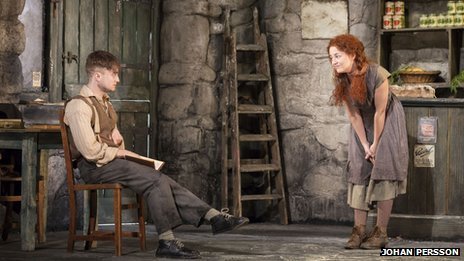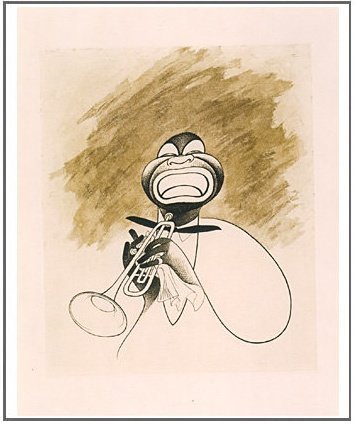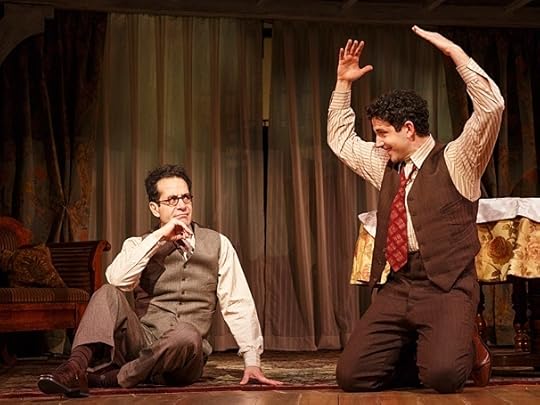Terry Teachout's Blog, page 7
April 23, 2014
Almanac: George Meredith on caricature
George Meredith, The Egoist
April 22, 2014
The kid is alright
* * *
Granted that it's always a pleasure to see one of Martin McDonagh's plays performed on Broadway, why mount "The Cripple of Inishmaan" there just five years after the Atlantic Theater Company imported a flawless all-Irish staging by Galway's Druid Theatre that should have moved uptown but didn't? As the millennials say, because Daniel Radcliffe. In the absence of the presence of the former Harry Potter, this production of Mr. McDonagh's bitingly black 1996 comedy about the not-so-small cruelties of village life would never have transferred from London's West End to the Cort Theatre, no matter how good it might be--and it's very good. But so, too, is Mr. Radcliffe. He is, in fact, that rarest of birds, a child movie star who decided to turn himself into an adult stage actor, worked at his craft with modesty and dead-serious determination and has become an accomplished performer...
 If you don't know "The Cripple of Inishmann," you won't have any doubts about Michael Grandage's production, in which Mr. Radcliffe plays a severely handicapped teenage boy who can no longer stomach the good-humored but thoughtless teasing of his neighbors (it says everything about them that they all casually refer to him as "Cripple Billy") and so removes himself to Hollywood to seek success in what the Irish call "fillums." Mr. Radcliffe is so far inside his character that it actually took the audience a few tantalizing seconds to realize who he was when he made his first entrance on Saturday night....
If you don't know "The Cripple of Inishmann," you won't have any doubts about Michael Grandage's production, in which Mr. Radcliffe plays a severely handicapped teenage boy who can no longer stomach the good-humored but thoughtless teasing of his neighbors (it says everything about them that they all casually refer to him as "Cripple Billy") and so removes himself to Hollywood to seek success in what the Irish call "fillums." Mr. Radcliffe is so far inside his character that it actually took the audience a few tantalizing seconds to realize who he was when he made his first entrance on Saturday night....If, on the other hand, you were fortunate enough to watch the Druids at work, you'll see at once what's missing this time around. Mr. McDonagh's play is also a take-no-prisoners satire on the sentimental clichés of stage-Irishness, and Mr. Grandage, instead of emphasizing them ("Oi have me drunkard mammy to look after") in order to make them self-evidently ludicrous, has mostly chosen to play them straight...
The Roundabout Theatre Company has revived "Violet," the 1997 Brian Crawley-Jeanine Tesori musical about a North Carolina girl with an axe-scarred face (Sutton Foster) who rides a Greyhound bus to Oklahoma in the hope of being made beautiful by an Oral Roberts-type televangelist. It's a sweet, unpretentious little show that doesn't really belong on Broadway, but the wondrous Ms. Foster pours the whole of her soul into it, and her performance is radiant and true in all ways but one: She is the opposite of plain.
 Yes, the animating premise is that Violet's inner beauty makes her outwardly lovely for those with eyes to see, but one grows tired of seeing pretty people cast in stage and screen roles that require them to pretend to be unattractive--especially when the script specifies, as is the case here, that the character's disfigurement be invisible to the audience. Why not find an ordinary-looking but charismatic performer who can act beautiful?...
Yes, the animating premise is that Violet's inner beauty makes her outwardly lovely for those with eyes to see, but one grows tired of seeing pretty people cast in stage and screen roles that require them to pretend to be unattractive--especially when the script specifies, as is the case here, that the character's disfigurement be invisible to the audience. Why not find an ordinary-looking but charismatic performer who can act beautiful?...Eric Coble breaks the U.S. record for clichés per minute in "The Velocity of Autumn," his new cranky-codger two-character comedy. Near-senile old lady? Check. Estranged gay son with unfinished emotional business? Check. Hackneyed plot? Check. (Mom wants to go on living in her Brooklyn house, but the kids want to put her in a nursing home, so she barricades the front door, brandishes a Molotov cocktail and tells them to bring it on.) Tap-the-tendon punch lines interspersed with ephiphanic moments of pseudo-poetry? Check, check and octuple check....
* * *
Read the whole thing here .
Lookback: how I became a critic
A reader wrote to ask if I'd consider posting a list of books and other works of art that had served as "turning points" in my life as a critic. I've never drawn up such a list, though I once wrote an essay for the New York Times Book Review called "I've Got a Crush on You" (it's in A Terry Teachout Reader) in which I talked about several authors whose styles I'd emulated at different times in my life. But what gave me the idea to become a critic--and what inspired me to become the kind of critic I became?...
Read the whole thing here .
Almanac: Macaulay on caricature
Thomas Babington Macaulay, "Machiavelli"
April 21, 2014
A vision of joy
 Al Hirschfeld
, who adored jazz, drew Louis Armstrong for the first time in 1939 and continued to do so repeatedly throughout his long and productive life. One of the last occasions was in 1990, thirteen years before Hirschfeld's death, when he did a portrait of the trumpeter called "Satchmo!" It is, in my opinion, the best of all possible Armstrong caricatures, one in which the joyous public figure whom the whole world loved is portrayed with a near-abstract simplicity of line that is not merely witty but beautiful.
Al Hirschfeld
, who adored jazz, drew Louis Armstrong for the first time in 1939 and continued to do so repeatedly throughout his long and productive life. One of the last occasions was in 1990, thirteen years before Hirschfeld's death, when he did a portrait of the trumpeter called "Satchmo!" It is, in my opinion, the best of all possible Armstrong caricatures, one in which the joyous public figure whom the whole world loved is portrayed with a near-abstract simplicity of line that is not merely witty but beautiful.I like "Satchmo!" so much that I used it as the last illustration in Pops: A Life of Louis Armstrong , accompanied by the following caption:
Many now feel ill at ease with the old-fashioned, crowd-pleasing entertainer portrayed in this 1990 caricature by Al Hirschfeld, but there was nothing false about Satchmo's unselfconscious smile.
Hirschfeld later turned "Satchmo!" into a limited-edition color lithograph that I saw when I went to the Margo Feiden Galleries six years ago to secure permission to reproduce the original drawing in my book, an experience that I blogged about here . I was bowled over by its richness and depth--it looked almost three-dimensional--and longed to buy a copy on the spot and add it to the Teachout Museum. Alas, the timing was financially unpropitious, and in due course I put the wild idea of owning a Hirschfeld out of my head.
That notion came back with full force, however, not long after Satchmo at the Waldorf opened in March. A fair amount of time had gone by since Mrs. T and I last added anything to our collection, and it seemed to both of us that the moment had arrived. I took a cab to the Margo Feiden Galleries last Thursday and returned home a few hours later with a pencil-signed copy of "Satchmo!" under my arm. I dropped it off at our framer over the weekend. We'll hang it in our New York apartment as soon as we decide on the right spot.
I can't imagine a more suitable way to celebrate the New York opening of Satchmo at the Waldorf, can you?
* * *
[image error]Longtime readers of this blog will recall that "Satchmo!" is the second caricature to make its way into the Teachout Museum. It was preceded by a drawing of Percy Grainger by Max Beerbohm, which I acquired in 2004 and about which I blogged here and here :
Max makes a point of saying that a caricature should be executed in "the most beautiful manner," and while it's true that his Grainger caricature is very funny--especially the society ladies clustered around the piano, who range in size from wasp-waisted to preposterously portly--it's also quite beautiful indeed. The composition is cunningly balanced, the line deft and clear, the light touches of watercolor wash miraculously subtle.
I mention this because I recently learned, purely by chance, of the existence of an art gallery in London that deals in Beerbohm caricatures. While none of them is of anyone who is still widely remembered, many are striking in their own right. So if, like me, you love Max's work and long to hang a piece of it on your wall, go here to peruse the inventory.
Just because: Buster Keaton on This Is Your Life
(This is the latest in a series of arts-related videos that appear in this space each Monday and Wednesday.)
Almanac: Max Beerbohm on caricature
Max Beerbohm, "The Spirit of Caricature"
April 18, 2014
All Hart
* * *
Moss Hart's "Act One" is the best Broadway memoir ever written, the stirring story of how a dirt-poor Bronx boy who grew up in a slum became a name-above-the-title playwright. The second half, which tells how the then-unknown Hart contrived to collaborate with George S. Kaufman, the Neil Simon of his day, on a 1930 comedy called "Once in a Lifetime" that made him rich and famous, is the stuff theatrical dreams are made of. Countless stage-struck youngsters have read it and resolved, however fleetingly, to do as he did.
 It's surprising that none of them ever tried to turn "Act One" into a play, but the failure of Dore Schary's lead-footed 1963 film version doubtless explains why so beloved a book took so long to find its way to the stage. Now James Lapine, who is to Stephen Sondheim what Hart was to Kaufman, has shouldered the task, both as writer and director. Unlike Schary, though, he's chosen to adapt all of "Act One," starting not with "Once in a Lifetime" but with Hart's sad childhood. The result is a thrillingly well-staged play that runs for two hours and 40 minutes but feels much shorter. Not only is "Act One" light on its theatrical feet, but it has the open-hearted impact of a melodrama--one that has the advantage of being true.
It's surprising that none of them ever tried to turn "Act One" into a play, but the failure of Dore Schary's lead-footed 1963 film version doubtless explains why so beloved a book took so long to find its way to the stage. Now James Lapine, who is to Stephen Sondheim what Hart was to Kaufman, has shouldered the task, both as writer and director. Unlike Schary, though, he's chosen to adapt all of "Act One," starting not with "Once in a Lifetime" but with Hart's sad childhood. The result is a thrillingly well-staged play that runs for two hours and 40 minutes but feels much shorter. Not only is "Act One" light on its theatrical feet, but it has the open-hearted impact of a melodrama--one that has the advantage of being true.Part of what makes "Act One" so potent is that Mr. Lapine disdains all irony in describing Hart's rise to fame. His was an old-fashioned American-dream-come-true tale, and it doesn't embarrass Mr. Lapine in the least to dish it up on a pageant-like scale reminiscent of the spectacular stage version of "Nicholas Nickleby." (It would also have made a great musical.) "Act One" is played out on a triple-decker revolving stage designed by Beowulf Boritt that catapults the 22 members of the cast from the Hart family's tenement apartment to Kaufman's Manhattan townhouse with cinematic speed....
It isn't surprising that "Of Mice and Men" works better on the stage than the page. John Steinbeck always envisioned his dialogue-intensive book as (in his phrase) "a play that can be read or a novel that can be played," and the fable-like tragedy of George (James Franco), an itinerant California farm worker, and Lennie (Chris O'Dowd), the simple-minded, pitifully innocent near-giant with whom he travels from job to job, gains immeasurably from theatrical presentation. The trick is to do it simply, and Anna D. Shapiro's staging leaves nothing to be desired in that department. Todd Rosenthal's windblown set is as plain as a tumbleweed, and the supporting cast, led by the matchless Jim Norton (he plays Candy, the aging field hand whose dog gets shot), leads us to the inescapable disaster with hard authenticity.
If only Mr. Franco, one of Hollywood's top teen heart-throbs, had had the modesty to realize that Broadway is the wrong place to make your professional stage debut! While he doesn't embarrass himself, his acting is flat and unmodulated by comparison with that of his infinitely more accomplished colleagues...
Steven Soderbergh, who claims to have given up making movies, has now directed an Off-Broadway play by one of his cinematic collaborators. Scott Z. Burns' "The Library" is a fictional docudrama about the aftermath of a high-school shooting. The premise is juicy: One of the survivors (Chloë Grace Moretz) is accused by another survivor (Daryl Sabara) of having told the shooter where several of her fellow students were hiding. And Mr. Burns doesn't fall into the trap of preaching a ripped-from-the-headlines sermon: While the last scene does get a bit portentous, "The Library" steers clear of banal point-making. But he never breaks through the smooth quasi-factual surface of the desperate situations that he portrays, and so "The Library," for all its evident seriousness of purpose, feels more like an unusually well-written "Law & Order" episode than a full-fledged play.
Though he has next to no stage experience, Mr. Soderbergh already has a firm grasp of the demands of his new medium...
* * *
Read the whole thing here .
The theatrical trailer for the 1963 film version of Act One:
Almanac: Paul Hindemith on teaching
Paul Hindemith (quoted in the Harvard Crimson, Nov. 29, 1949)
April 17, 2014
So you want to see a show?
Here's my list of recommended Broadway, off-Broadway, and out-of-town shows, updated weekly. In all cases, I gave these shows favorable reviews (if sometimes qualifiedly so) in The Wall Street Journal when they opened. For more information, click on the title.
BROADWAY:
• Bullets Over Broadway (musical, PG-13, reviewed here)
• A Gentleman's Guide to Love & Murder (musical, PG-13, reviewed here)
• Matilda (musical, G, nearly all performances sold out last week, reviewed here)
• Les Misérables (musical, G, too long and complicated for young children, nearly all performances sold out last week, reviewed here)
• Once (musical, G/PG-13, reviewed here)
• A Raisin in the Sun (drama, G/PG-13, all performances sold out last week, reviewed here)
• Rocky (musical, G/PG-13, reviewed here)
OFF BROADWAY:
• Avenue Q (musical, R, adult subject matter and one show-stopping scene of puppet-on-puppet sex, reviewed here)
• The Fantasticks (musical, G, suitable for children capable of enjoying a love story, reviewed here)
• The Heir Apparent (verse comedy, PG-13, closes May 4, reviewed here)
CLOSING SOON OFF BROADWAY:
• London Wall (serious comedy, PG-13, newly extended through Apr. 26, reviewed here)
Terry Teachout's Blog
- Terry Teachout's profile
- 45 followers



